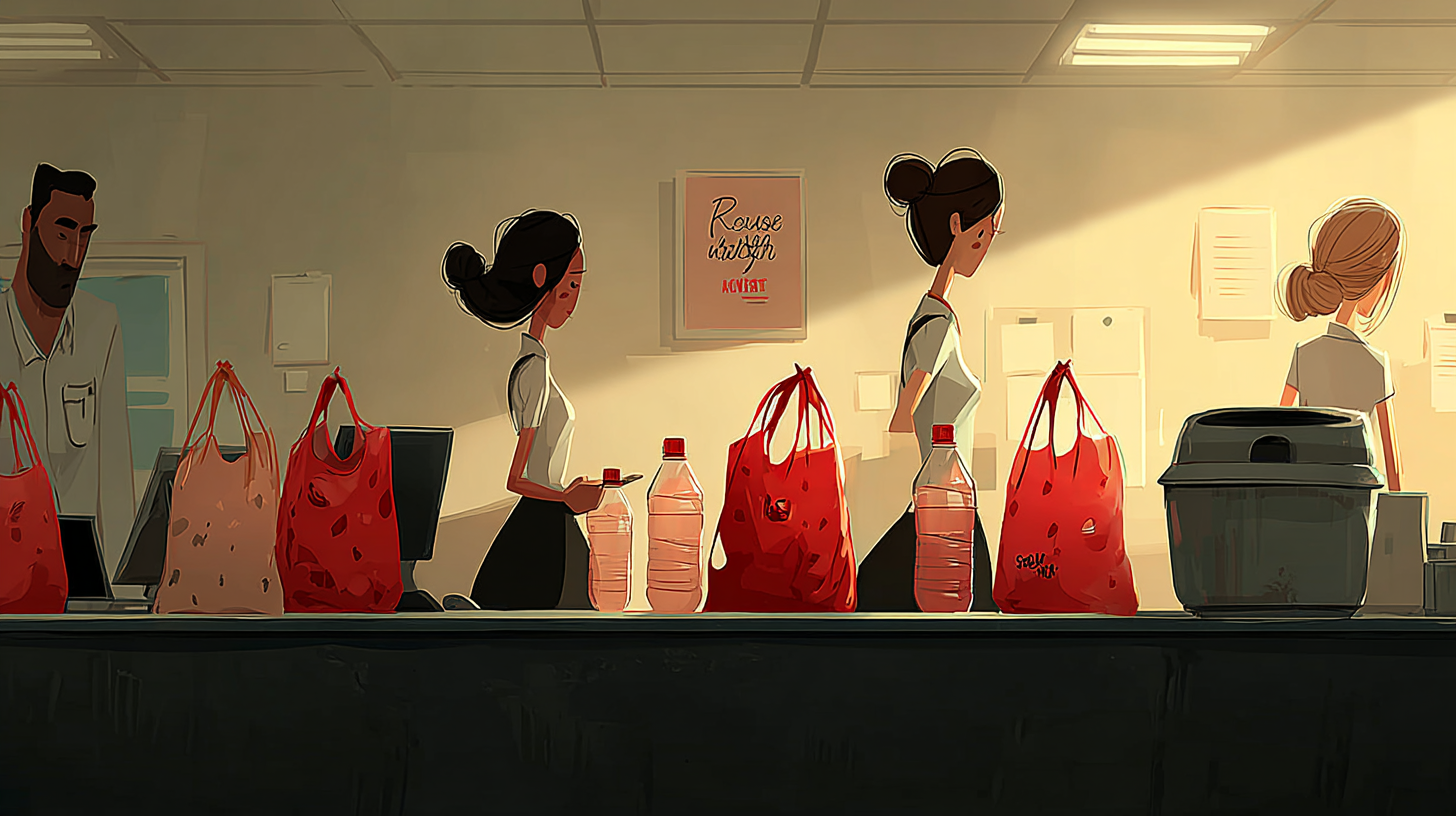Plastic means “something made of plastic or artificial.”
plastic は「プラスチックでできたものや、人工的なもの」を表す言葉です。
以下は英単語 “Plastic” に関するストーリー型学習コンテンツです。まずは大枠の意味を理解して最後の文章で確認しましょう。
主な意味(main meaning)
| 品詞 | 発音記号 | 意味(簡潔) | 英語例文 |
|---|---|---|---|
| 名詞 | /ˈplæstɪk/ | プラスチック(人工で作られた材料) | This bottle is made of plastic. |
| 形容詞 | /ˈplæstɪk/ | プラスチック製の、人工的な | She bought a plastic chair for the garden. |
語源(etymology)
“Plastic” はギリシャ語 plastikos(形づくれる、形を変えられる)に由来します。核となるイメージは「形を自由に変えられるもの」です。
類義語(synonyms)
| 類義語 | 意味 | 例文 |
|---|---|---|
| synthetic | 合成の | The dress is made of synthetic fibers. |
| artificial | 人工の | The flowers on the table are artificial. |
| man-made | 人工の | The island is man-made. |
| resin | 樹脂 | The artist used resin to make the sculpture. |
反義語(antonyms)
| 反義語 | 意味 | 例文 |
|---|---|---|
| natural | 自然の | This table is made of natural wood. |
| organic | 有機の | She prefers organic materials for clothing. |
コロケーション(collocations)
| コロケーション | 例文 |
|---|---|
| plastic bag | He carried the groceries in a plastic bag. |
| plastic bottle | Please recycle plastic bottles. |
| plastic waste | Plastic waste is a big problem in the ocean. |
| plastic surgery | She had plastic surgery after the accident. |
2項表現(binomials)
| 2項表現 | 例文 |
|---|---|
| plastic and glass | The shop recycles plastic and glass. |
| paper and plastic | They used paper and plastic cups at the party. |
英語ストーリー(english story)
The Office Without Plastic
Last summer, our company decided to start a new project to reduce waste. The first step was to limit the use of plastic. Every day, our office produced many plastic bottles and plastic bags. We all knew that plastic waste was harmful to the environment, but we had never taken real action.
Our manager, Ms. Green, explained in the meeting, “From now on, we should try to use fewer plastic items. Please bring your own cups instead of using plastic and glass disposable ones. Let’s make a positive change together.”
At first, some workers complained. One said, “But synthetic and artificial materials are cheap and easy to use.” Another added, “Sometimes man-made products like plastic are more convenient than natural ones.”
Ms. Green smiled and replied, “That may be true, but we should think about the future. We must protect our oceans from plastic waste. Instead of using plastic bags, please use cloth bags. Instead of buying plastic bottles, please use reusable bottles.”
A week later, everyone began to notice the difference. The trash bins were no longer full of plastic cups and bottles. The office looked cleaner. Some workers even started bringing snacks in small glass containers instead of plastic bags.
One day, I had lunch with my colleague Anna. She said, “It feels good to use natural and organic materials. It’s healthier and better for the environment.” I agreed and replied, “Yes, and it also makes us more creative. For example, I started making my own lunch box instead of buying sandwiches wrapped in plastic.”
Later, we had a small problem. A client asked if we could provide plastic and glass cups for a party. We discussed it and decided to use paper and plastic cups that were recyclable. It was a compromise, but it still reduced waste.
At the end of the month, Ms. Green proudly said, “Thanks to all of you, we have reduced plastic waste by half. This shows that small changes can make a big difference.”
The project taught us that while plastic is useful, it should not be overused. It also showed us the value of cooperation in the workplace. By working together, we created a cleaner, healthier environment and felt proud of our achievement.
和訳
プラスチックのないオフィス
去年の夏、私たちの会社はゴミを減らす新しいプロジェクトを始めることにしました。最初のステップは**plastic(プラスチック)の使用を減らすことでした。毎日、オフィスではたくさんのplastic bottles(プラスチックボトル)やplastic bags(プラスチック袋)が出ていました。私たちはplastic waste(プラスチックごみ)**が環境に悪いことを知っていましたが、実際の行動はしていませんでした。
マネージャーのグリーンさんは会議で説明しました。「これからは、もっと**plastic(プラスチック)**製品を減らしましょう。**plastic and glass(プラスチックやガラス)**の使い捨てカップではなく、自分のカップを持ってきてください。みんなで前向きな変化を作りましょう。」
最初は社員の中には不満を言う人もいました。「でも、**synthetic(合成の)やartificial(人工の)素材は安くて便利です。」
別の人は「時にはman-made(人工の)**製品の方が自然のものより便利です」と言いました。
グリーンさんは笑顔で答えました。「確かにそうですが、未来を考えなければなりません。海を**plastic waste(プラスチックごみ)**から守りましょう。プラスチック袋の代わりに布袋を使いましょう。**plastic bottles(プラスチックボトル)**を買う代わりに、再利用できるボトルを使いましょう。」
1週間後、みんな違いに気づき始めました。ゴミ箱はもはやプラスチックのカップやボトルでいっぱいではありませんでした。オフィスはきれいに見えました。社員の中には、**plastic bags(プラスチック袋)**の代わりにガラス容器にお菓子を入れて持ってくる人もいました。
ある日、同僚のアンナとランチをしました。彼女は言いました。「**natural(自然の)やorganic(有機の)**素材を使うのは気持ちがいいです。体にも環境にもいいです。」
私は同意して答えました。「そうだね。それに私たちをもっとクリエイティブにしてくれるよ。例えば、私はプラスチックに包まれたサンドイッチを買う代わりに、自分で弁当を作るようになったんだ。」
その後、ちょっとした問題がありました。あるお客様が、パーティーのために**plastic and glass(プラスチックとガラス)のカップを提供できるか尋ねてきたのです。私たちは話し合い、リサイクルできるpaper and plastic(紙とプラスチック)**のカップを使うことにしました。これは妥協でしたが、それでもゴミは減りました。
月末、グリーンさんは誇らしげに言いました。「みなさんのおかげで、**plastic waste(プラスチックごみ)**を半分に減らせました。小さな変化が大きな違いを生むのです。」
このプロジェクトは、**plastic(プラスチック)**が便利であっても使いすぎてはいけないことを教えてくれました。また、職場での協力の大切さも教えてくれました。みんなで協力することで、よりきれいで健康的な環境を作り出し、その成果を誇りに思えました。
Q&A
Q: plastic と synthetic の違いは?
A: plastic は特定の「プラスチック」という素材を指します。synthetic は「合成の」という広い意味で、プラスチックを含む人工的な素材全般を表します。
Q: plastic と artificial の違いは?
A: plastic は具体的な素材(プラスチック)を表します。artificial は「人工的な」という抽象的な性質を指し、花や笑顔など物質以外にも使えます(例:artificial flowers, artificial smile)。
Q: plastic と man-made の違いは?
A: plastic は「プラスチック」という特定の物質ですが、man-made は「人間が作ったもの全般」を意味します。プラスチックも man-made の一種ですが、man-made はもっと広い表現です。
Q: plastic と resin の違いは?
A: plastic は工業的に作られた合成物質ですが、resin は「樹脂」で、天然のものと人工のものがあります。プラスチック製品の多くは合成樹脂(synthetic resin)から作られます。
Q: plastic と natural の違いは?
A: plastic は人工的に作られる素材ですが、natural は「自然に存在するもの」を意味します。木や石、綿などが natural です。
Q: plastic と organic の違いは?
A: plastic は人工的に化学的な方法で作られます。organic は「有機的・自然に近い」という意味で、化学肥料を使わずに育てた食べ物や素材を指します。
Q: plastic bag と plastic bottle の違いは?
A: どちらもプラスチック製品ですが、bag は「袋」、bottle は「ボトル」という形状や用途の違いです。
Q: plastic waste と plastic surgery の違いは?
A: plastic waste は「プラスチックごみ」、plastic surgery は「形成外科手術」です。どちらも plastic を含みますが、意味はまったく異なります。
Q: plastic and glass と paper and plastic の違いは?
A: plastic and glass は「リサイクル対象の素材の組み合わせ」としてよく使われます。paper and plastic は「使い捨て製品の組み合わせ」として、日常のシーンでよく登場します。



コメント